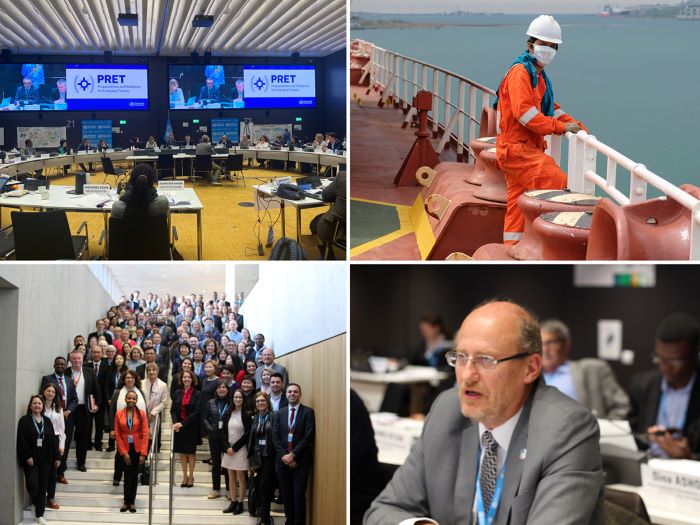

IMO is participating in global efforts led by the World Health Organization (WHO) to better prepare for possible future disease pandemics.
Before the COVID-19 pandemic, WHO’s focus was mainly on preparedness planning according to types of pathogens. Building on lessons learned during COVID-19 and other recent health emergencies, the focus is now on groups of diseases according to their mode of transmission, for example respiratory, vector-borne, or foodborne diseases.
IMO attended the first WHO meeting on Preparedness and Resilience for Emerging Threats (PRET) held at WHO headquarters in Geneva, Switzerland, from 24 to 26 April. The PRET initiative will initially focus on respiratory pathogens which are typically easily transmissible and pose a significant public health threat.


The meeting’s aim was to bring together partners to work on a unified approach toward respiratory pandemic preparedness. IMO promoted consideration of concerns specific to transport workers – and to seafarers in particular. Due to the significant impact on maritime shipping created by COVID-19-related travel restrictions around the world, IMO has urged Member States to designate seafarers as key workers and to enable them to travel without regard to their nationality between the ships that constitute their workplace, and their countries of residence.
Alongside IMO, the meeting was attended by national, regional, and global WHO staff representatives, along with other UN specialized agencies, the International Civil Aviation Organization (ICAO), the Food and Agriculture Organization (FAO), and the International Labour Organization (ILO), as well as non-governmental organizations such as the International Air Transport Association (IATA).
PRET is a call to action to accelerate preparedness for pandemics and emerging threats globally. Through collective commitment, WHO aims to see progress by December 2025 with:
1. updated preparedness plans that affirm priority actions;
2. increased connectivity among stakeholders in pandemic preparedness planning, through a cross-sectoral approach and UN interagency cooperation and coordination; and
3. dedicated sustained investments, financing, and monitoring of pandemic preparedness with a particular focus on addressing gaps identified during past pandemics and epidemics, including maritime transport issues.
There was also a discussion ahead of the launch of Module 1 of the new WHO guidance for stakeholders: Planning for respiratory pandemic preparedness Version 1, which focuses on respiratory pathogens, including influenza, coronaviruses, and respiratory syncytial virus.
Press Release










We believe that knowledge is power, and we’re committed to empowering our readers with the information and resources they need to succeed in the merchant navy industry.
Whether you’re looking for advice on career planning, news and analysis, or just want to connect with other aspiring merchant navy applicants, The Marine Learners is the place to be.